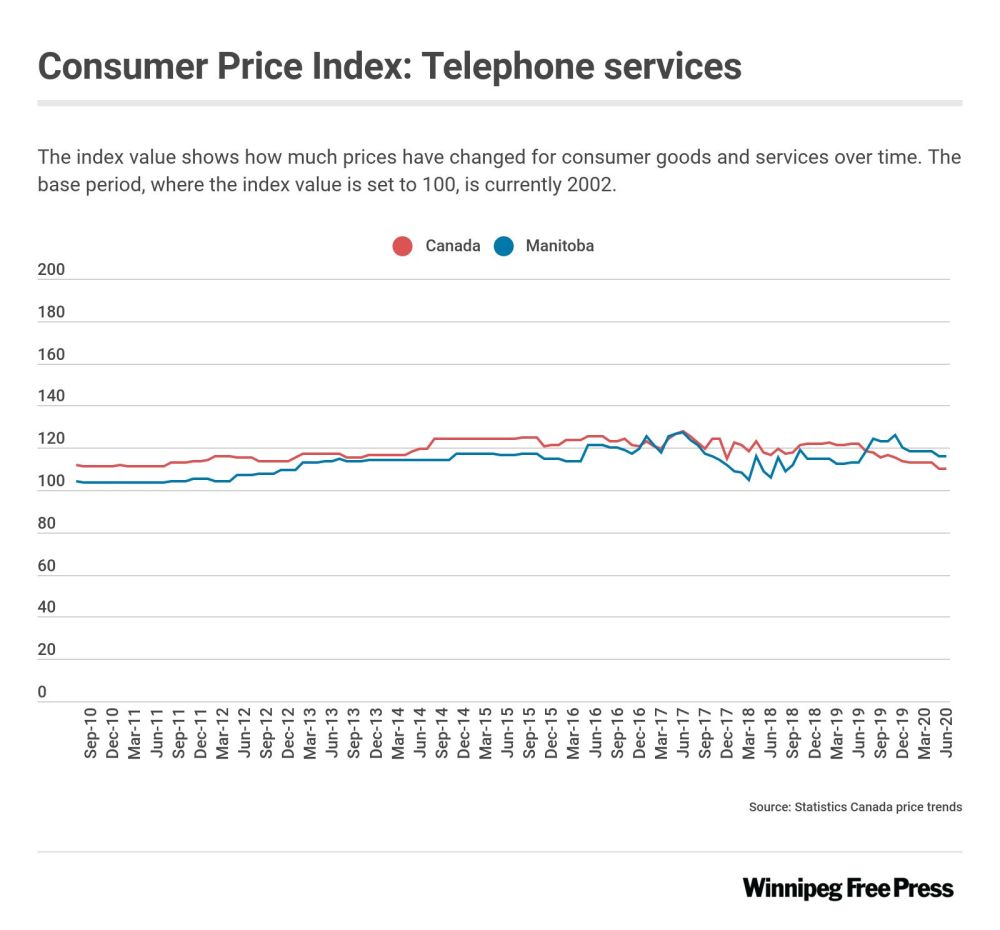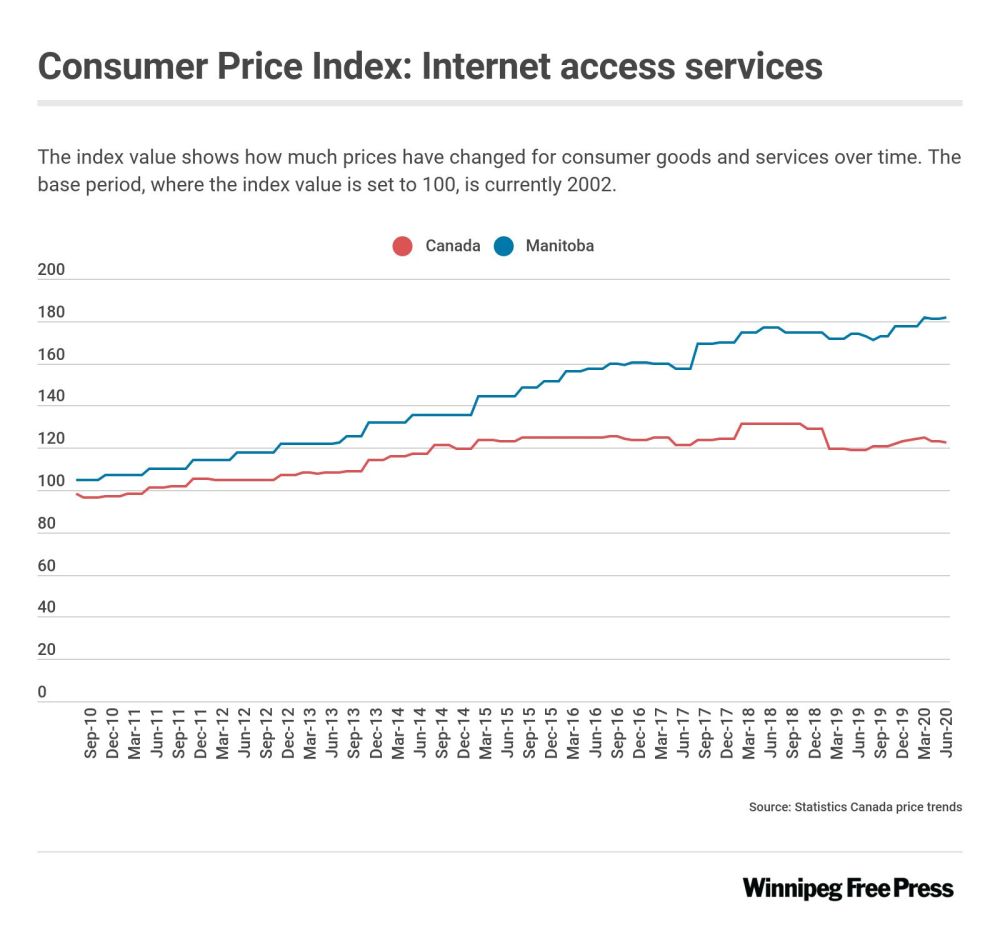Manitobans shelling out more for phone service, other Canadians paying less
Read this article for free:
or
Already have an account? Log in here »
To continue reading, please subscribe:
Monthly Digital Subscription
$0 for the first 4 weeks*
- Enjoy unlimited reading on winnipegfreepress.com
- Read the E-Edition, our digital replica newspaper
- Access News Break, our award-winning app
- Play interactive puzzles
*No charge for 4 weeks then price increases to the regular rate of $19.00 plus GST every four weeks. Offer available to new and qualified returning subscribers only. Cancel any time.
Monthly Digital Subscription
$4.75/week*
- Enjoy unlimited reading on winnipegfreepress.com
- Read the E-Edition, our digital replica newspaper
- Access News Break, our award-winning app
- Play interactive puzzles
*Billed as $19 plus GST every four weeks. Cancel any time.
To continue reading, please subscribe:
Add Free Press access to your Brandon Sun subscription for only an additional
$1 for the first 4 weeks*
*Your next subscription payment will increase by $1.00 and you will be charged $16.99 plus GST for four weeks. After four weeks, your payment will increase to $23.99 plus GST every four weeks.
Read unlimited articles for free today:
or
Already have an account? Log in here »
Hey there, time traveller!
This article was published 22/07/2020 (1970 days ago), so information in it may no longer be current.
OTTAWA — At a time when Manitobans are relying more on their phones, their bills are the highest they’ve been in years.
Manitoba is the sole province where people are paying more for phone service than a year ago, according to Statistics Canada data released Wednesday.
“Manitoba has lost the edge that it had,” Ben Klass, a Manitoban pursuing a PhD in telecommunications policy at Carleton University in Ottawa.

“This data clearly show that the prices in Manitoba have diverged (while) prices in other provinces have dropped.”
Manitobans have long suspected that Bell’s March 2017 acquisition of MTS would lead to higher mobile-phone costs.
However, the federal Competition Bureau, which reviews companies’ confidential internal records, could not confirm that contention as recently as last week.
On Wednesday, Statistics Canada updated its Consumer Price Index, which assesses monthly changes in the publicly listed price of goods and services.
The data show that in June, compared with a year prior, Manitoba phone plans cost 2.7 per cent more for the same variety of services.
That’s compared with a drop of 15.3 per cent in Alberta, and Maritime provinces paying roughly 8 per cent less for phone bills compared with 12 months ago.
In 2018, Winnipeg anti-poverty groups told the Canadian Radio-television and Telecommunications Commission that telcos were ripping off the most vulnerable Manitobans.
In hearings on “misleading or aggressive sales practices” by the big three telecommunications carriers, the groups testified that advertised rates are often not available for the poorest Manitobans, and that credit checks make phone service harder to access than utilities like hydro and water.
Gloria Desorcy, Manitoba head of the Consumers’ Association of Canada, testified at those hearings. She said the Wednesday data are concerning during the COVID-19 pandemic, when people are relying on phones to work and maintain a social life.
“This impacts every consumer that uses telephones,” she said. “We’re seeing the huge importance of communications right now.”
Bell absorbed MTS in 2017, and pledged it would not raise wireless rates for a year, though it did increase home-phone and internet rates.
The CPI only compares the change of prices available on the market over time, and not what people are actually paying. Its phone-service figures are 78 per cent based on mobile carriers.
Statistics Canada changed its methodology in 2018 to exclude the incremental payments to carriers for smartphones and instead only tabulate mobile usage plans.
When MTS was still a separate player, the CPI included the cost of plans that included gradually paying for smartphones.
The Canadian Wireless Telecommunications Association, an industry group, noted Wednesday that CRTC data suggest the rates available in different provinces are comparable.
Hotel prices drop further outside Manitoba: stats
OTTAWA — Wednesday’s Consumer Price Index suggests Manitoba hotels aren’t dropping prices as much as competitors in other provinces.
The CPI logged a 2.1 drop in listed “traveller accommodation” prices in June compared with a year prior.
OTTAWA — Wednesday’s Consumer Price Index suggests Manitoba hotels aren’t dropping prices as much as competitors in other provinces.
The CPI logged a 2.1 drop in listed “traveller accommodation” prices in June compared with a year prior.
That drop was on average 25.1 per cent across Canada, with the second-lowest drop among provinces logged at 14.4 per cent in Saskatchewan.
Scott Jocelyn, head of the Manitoba Hotel Association, wasn’t sure what was driving that data.
He said Manitoba hotels are only operating around 30 per cent capacity, and many in Winnipeg have remained closed through the COVID-19 pandemic.
“Hotels have been severely impacted, and I don’t need to see the numbers to know that,” Jocelyn said.
—Dylan Robertson
Klass said that suggests Manitoba had better prices when MTS existed, while rates from the remaining regional carrier, Xplornet, aren’t much cheaper than the big three.
Meanwhile, other provinces have seen rates drop thanks to Freedom Mobile and local carriers like Videotron and Eastlink.
The CPI data show numbers shifting last summer, when carriers offered unlimited data plans that were a good deal in other provinces, but not in Manitoba.
Klass said that suggests costs are converging across Canada.
He added that it’s not entirely clear that phone rates would be lower if MTS was still a separate carrier.
“It’s hard to say. Deriving causality in a market that’s as dynamic and complex as this one is complicated,” Klass said.
The Competition Bureau agrees.
In May 2019, the agency told the CRTC in filings that “wireless prices in Manitoba do not appear to have increased subsequent to the acquisition of MTS by Bell.”
Last November, the Competition Bureau said “it is difficult to make firm conclusions about levels of competition in Manitoba” for a variety of reasons.
MTS divested some assets to Xplornet and Telus, and the impact on costs isn’t yet clear, while “there has been speculation that one of the Big 3 may be planning to purchase SaskTel and therefore, may be moderating their conduct.”
Last week, the agency had nothing further to add on whether MTS’ sale was inflating prices, in its latest CRTC filing.
dylan.robertson@freepress.mb.ca








